I first encountered Annie Fenn when she gave a video presentation, “Cooking in the Brain Health Kitchen” for the Aspen Brain Institute’s Expert series. Her talk charmed me, being not only down to earth, but also highly informative with many take away tips as well as some great recipes.
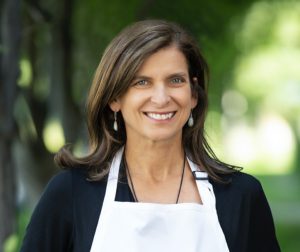
Annie Fenn
Annie knows what she’s talking about. A longtime obstetrician/gynecologist, Annie turned to full time cooking after retiring. She studied cooking in Italy, France, Mexico and at the Culinary Institute of America and specialized in “cooking whole foods for optimal nutrition.”
Inspired by her mother’s diagnosis of early-stage Alzheimers, Annie turned her culinary attention to the way diet can affect the brain. She began teaching brain healthy cooking classes in 2015 and, in 2017, founded her terrific website Brain Health Kitchen —a multidimensional platform for her many special insights aimed at reducing the risk of dementia and improving cognitive function as one ages.
Although she travels worldwide to lecture and teach brain healthy cooking, Sweet Leisure caught up with her in Jackson, Wyoming, where she lives with her husband and two teenage sons. Ever so curious about this remarkable woman, we asked her the following questions by email and she responded accordingly.
Q: Will you define brain health for us?
A: Brain health means taking care of your brain to minimize inflammation that, over time, can set up an environment for Alzheimer’s and other dementias. It means keeping your blood vessels healthy so you have a robust blood supply to the brain as you age. It means slowing down the aging of the brain by paying attention to what you eat and how you live your life. It also means paying attention to your mental wellness and being proactive about cultivating mental health. You want your brainspan—the time when the brain is thriving and memories are intact—to match your lifespan. That’s the goal.
Q: What are lifestyle strategies (besides diet) to keep the brain fit?
A: Exercise is at the top of a long list of lifestyle factors now proven to keep the brain healthy. The good news is that you don’t have to be a hard-core athlete to get the benefits. Activities like walking, gardening, and yoga are also beneficial. Sleep is extremely important. Getting enough high-quality sleep should be a priority if you want your brain to age well. Others include not smoking, keeping blood pressure under control at mid-life, maintaining a healthy weight, correcting hearing loss, minimizing alcohol intake, and protecting the brain from trauma.
Q: Is a brain-healthy diet also a diet to optimize health in general?
A: Yes, absolutely. When you start eating through the lens of brain health, you are also reducing your risk of all the “lifestyle diseases” so prevalent in our country now, such as diabetes, obesity, and hypertension. Following a brain-healthy diet, which is mostly (but not exclusively) plant-based, also reduces the risk of many cancers.
Q: What are the top brain-healthy food groups? The key brain-healthy power foods?
A: The best data we have on how to eat to fend off Alzheimer’s disease comes from the MIND diet study published in 2015 by researchers at Rush University. The MIND diet is a spin-off of the Mediterranean diet specifically geared towards brain health. The MIND diet researchers describe 10 brain-healthy food groups and 5 food groups to limit. To be included as a brain-healthy food group, that food, such as berries, had to have substantial scientific literature supporting the fact that it contributes to brain health.
I always ask my students to include these 9 food groups in their diet on a regular basis: berries, leafy greens, vegetables, nuts and seeds, legumes, whole grains, fish and seafood, poultry, olive oil. Red wine (up to 5 ounces per day) was included in the original MIND diet study as the 10th food group, but has since been dropped for the ongoing MIND diet trial, a placebo-controlled continuation of the study. To read more about how much of each food group to eat, I break it down for you in this article: What to Eat to Fend Off Alzheimer’s.
Q: What foods contribute to cognitive decline?
A: It is equally important to limit the foods that cause inflammation in the brain. This doesn’t mean you have to give up all the foods you love! This is not an elimination diet. In fact, it’s not a diet at all but more of a lifestyle and balanced approach to eating. The greater diversity in your food choices the better off your gut health and brain health will be. But it does mean limiting processed and packaged foods, fried foods, foods high in saturated fat (like butter and cheese), and foods high in sugar (like sugary drinks, pastries, and sweets.) I would also include processed oils here (like grapeseed, sunflower, safflower, soybean, corn, rice brain, palm, and any hydrogenated vegetable oils) because they contain inflammatory substances and brain unfriendly fats. You can read more about how to limit these foods here: Five Food Groups to Avoid to Keep Your Brain Healthy.
Q: Out of all of the recipes that you have developed—what is your number one favorite? And Why?
A: I have many, many favorites, but my cooking school students’ all-time favorite recipe is a warm kale salad that checks off 4 of the brain-healthy food groups. I think it’s so popular because it comes together quickly, all in one pan, and leftovers are great too. Even people who don’t love kale really like this salad. It also features two brain health superstar ingredients: kale, the most nutrient-dense of the leafy greens,
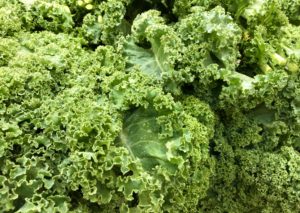
Kale
and blackberries,the commonly available berry that provides the most polyphenols.
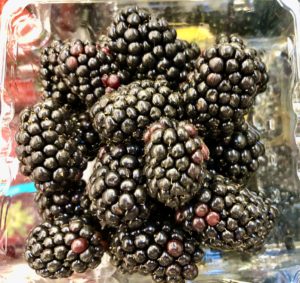
That’s why I chose the blackberry as my logo for the Brain Health Kitchen!

Q: Will you share the recipe?
A: Yes, of course!
Annie sent the recipe and it couldn’t be simpler. She first heats olive oil in a skillet, tosses in chopped kale, and cooks until the kale is somewhat wilted. She then transfers the kale to a plate and sprinkles with pistachios (or other nuts such as almonds and cashews) that she has lightly toasted in the same skillet. The dressing is simply blackberries (or other berries—your choice) and balsamic vinegar reduced in the same skillet until thickened.
Seasoning relies on fresh mint and salt.

Mint
And a perfectionist in all she does, Annie decorates her salad with edible blooms, but says this is optional. 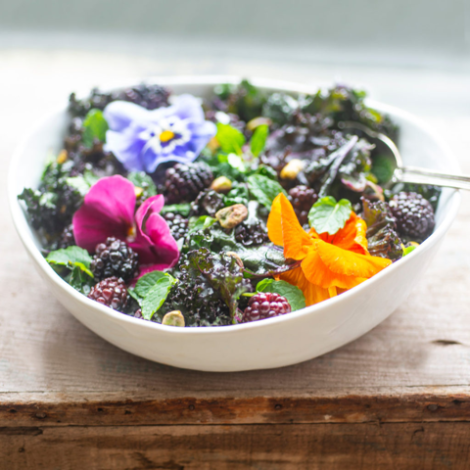
Check out Warm Kale Blackberry Salad for details.
For more about Annie Fenn and the Brain Health Kitchen, click HERE.
To see Annie’s segment “Cooking in the Brain Health Kitchen” from the Aspen Brain Institute’s Expert Series, click HERE.
For more about mint, click HERE.
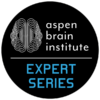 For more about the Aspen Brain Institute and the Institute’s free virtual EXPERT SERIES 2.0 click HERE.
For more about the Aspen Brain Institute and the Institute’s free virtual EXPERT SERIES 2.0 click HERE.
